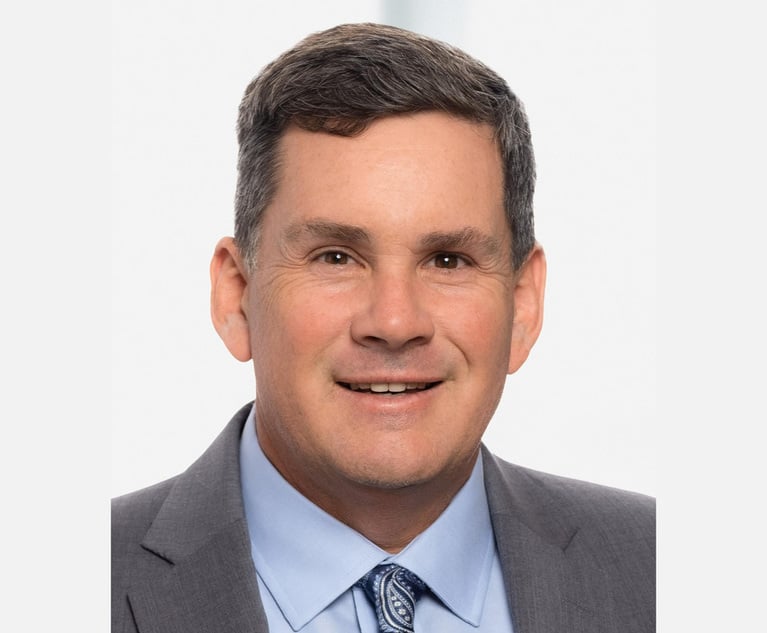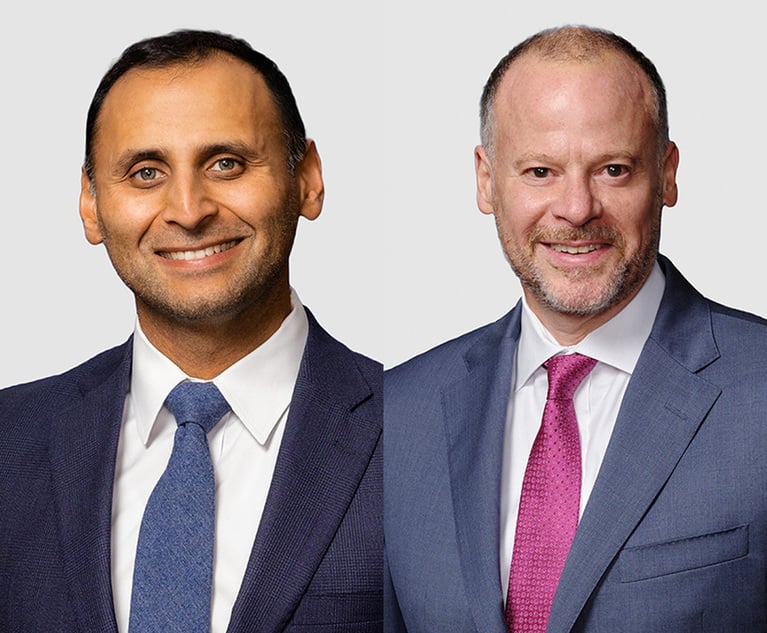2020's Final Bunch of Litigator of the Week Runners-Up and Shout Outs
Latham, Sidley and Wilson Sonsini take home runners-up honors this week.
December 18, 2020 at 07:25 AM
3 minute read
First up: A Latham & Watkins team including partners Michele Johnson, Andy Clubok, Beth Deeley, Hilary Mattis and Susan Engel. They convinced a federal judge in the Northern District of California to dismiss a securities class action against Twitter Inc. Plaintiffs claimed the company and executives misled investors in the run-up to a 20% drop in the company's stock after Twitter announced changes to how and when it shares certain user data with advertisers. U.S. District Judge Yvonne Gonzalez Rogers found on December 10 that the plaintiffs had failed to allege any misleading statements or omissions or sufficiently plead scienter.
Sidley Austin partner Sara Brody and counsel Nicole Ryan likewise get a runner-up nod for bringing home a big securities win in the Northern District of California. The pair won a dismissal with prejudice for Flex Ltd. and four of its executives in a case where plaintiffs (represented by Labaton Sucharow) alleged the multibillion company's stock dropped 35% when Flex announced the termination of a production contract with Nike to make shoes in Mexico. The Sidley lawyers convinced U.S. District Judge Lucy Koh to take judicial notice of disclosures about the increased costs of the Nike operations. Koh found those disclosures poked a hole in the theory that Flex's profitability projection about the Nike deal were false and misleading. Sidley associate Stephen Chang also worked on the matter.
Wilson Sonsini Goodrich & Rosati duo Moe Fodeman and Michael Sommer have landed their second LOTW runner-up spot in as many months. You might remember that last month they deftly secured $136 million in restitution for former shareholders of a Canadian company who lost their stake in valuable mining rights due to a bribery scheme in the Democratic Republic of the Congo. This week, in a more traditional white collar defense setting, the pair secured a time-served sentence of six days for Professor Bo Mao after he pled guilty to lying to the FBI. Mao, a computer scientist at a Chinese University, had initially faced the much more serious charge of wire fraud conspiracy based on allegations he used his credentials as a visiting professor at University of Texas at Arlington to steal "cutting edge" U.S. technology for the benefit of telecom giant Huawei.
This content has been archived. It is available through our partners, LexisNexis® and Bloomberg Law.
To view this content, please continue to their sites.
Not a Lexis Subscriber?
Subscribe Now
Not a Bloomberg Law Subscriber?
Subscribe Now
NOT FOR REPRINT
© 2024 ALM Global, LLC, All Rights Reserved. Request academic re-use from www.copyright.com. All other uses, submit a request to [email protected]. For more information visit Asset & Logo Licensing.
You Might Like
View All
Litigation Leaders: Labaton’s Eric Belfi on Running Case Investigation, Analysis and Evaluation In-House

Trying a Case for Abu Ghraib Detainees Two Decades After Abuse

Should It Be Left to the Plaintiffs Bar to Enforce Judicial Privacy Laws?
7 minute readLaw Firms Mentioned
Trending Stories
Who Got The Work
Michael G. Bongiorno, Andrew Scott Dulberg and Elizabeth E. Driscoll from Wilmer Cutler Pickering Hale and Dorr have stepped in to represent Symbotic Inc., an A.I.-enabled technology platform that focuses on increasing supply chain efficiency, and other defendants in a pending shareholder derivative lawsuit. The case, filed Oct. 2 in Massachusetts District Court by the Brown Law Firm on behalf of Stephen Austen, accuses certain officers and directors of misleading investors in regard to Symbotic's potential for margin growth by failing to disclose that the company was not equipped to timely deploy its systems or manage expenses through project delays. The case, assigned to U.S. District Judge Nathaniel M. Gorton, is 1:24-cv-12522, Austen v. Cohen et al.
Who Got The Work
Edmund Polubinski and Marie Killmond of Davis Polk & Wardwell have entered appearances for data platform software development company MongoDB and other defendants in a pending shareholder derivative lawsuit. The action, filed Oct. 7 in New York Southern District Court by the Brown Law Firm, accuses the company's directors and/or officers of falsely expressing confidence in the company’s restructuring of its sales incentive plan and downplaying the severity of decreases in its upfront commitments. The case is 1:24-cv-07594, Roy v. Ittycheria et al.
Who Got The Work
Amy O. Bruchs and Kurt F. Ellison of Michael Best & Friedrich have entered appearances for Epic Systems Corp. in a pending employment discrimination lawsuit. The suit was filed Sept. 7 in Wisconsin Western District Court by Levine Eisberner LLC and Siri & Glimstad on behalf of a project manager who claims that he was wrongfully terminated after applying for a religious exemption to the defendant's COVID-19 vaccine mandate. The case, assigned to U.S. Magistrate Judge Anita Marie Boor, is 3:24-cv-00630, Secker, Nathan v. Epic Systems Corporation.
Who Got The Work
David X. Sullivan, Thomas J. Finn and Gregory A. Hall from McCarter & English have entered appearances for Sunrun Installation Services in a pending civil rights lawsuit. The complaint was filed Sept. 4 in Connecticut District Court by attorney Robert M. Berke on behalf of former employee George Edward Steins, who was arrested and charged with employing an unregistered home improvement salesperson. The complaint alleges that had Sunrun informed the Connecticut Department of Consumer Protection that the plaintiff's employment had ended in 2017 and that he no longer held Sunrun's home improvement contractor license, he would not have been hit with charges, which were dismissed in May 2024. The case, assigned to U.S. District Judge Jeffrey A. Meyer, is 3:24-cv-01423, Steins v. Sunrun, Inc. et al.
Who Got The Work
Greenberg Traurig shareholder Joshua L. Raskin has entered an appearance for boohoo.com UK Ltd. in a pending patent infringement lawsuit. The suit, filed Sept. 3 in Texas Eastern District Court by Rozier Hardt McDonough on behalf of Alto Dynamics, asserts five patents related to an online shopping platform. The case, assigned to U.S. District Judge Rodney Gilstrap, is 2:24-cv-00719, Alto Dynamics, LLC v. boohoo.com UK Limited.
Featured Firms
Law Offices of Gary Martin Hays & Associates, P.C.
(470) 294-1674
Law Offices of Mark E. Salomone
(857) 444-6468
Smith & Hassler
(713) 739-1250







